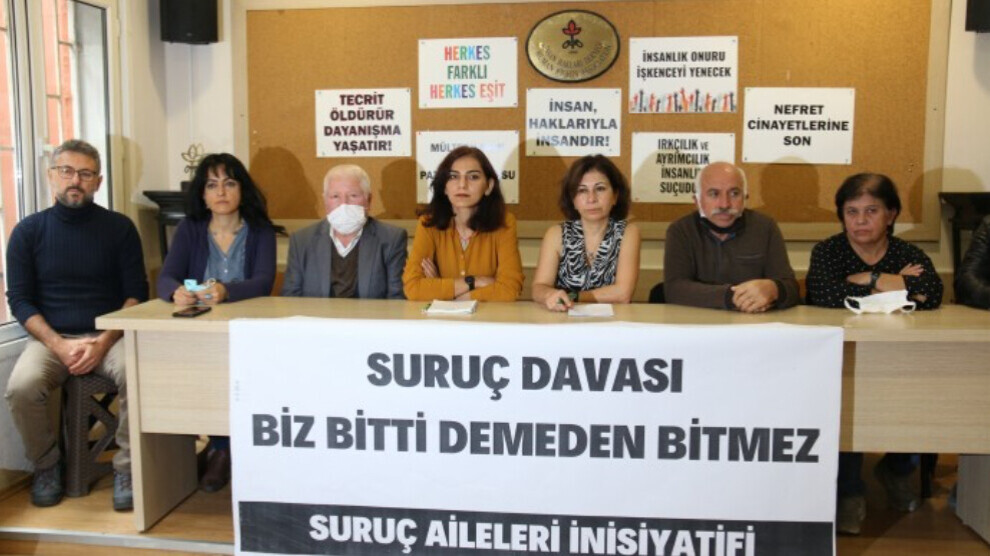The Suruç Families Initiative made a press statement at the Istanbul Branch of the Human Rights Association (IHD) on Wednesday to address the closing of the Suruç Massacre case, in which 33 people were killed, and the investigations launched against the lawyers of the claimants and those injured in the massacre. Peoples' Democratic Congress (HDK) Istanbul Provincial Assembly co-spokesperson Erkan Tepeli, Peoples' Democratic Party (HDP) Istanbul Provincial co-chair Elif Bulut and Socialist Party of the Oppressed (ESP) co-chair Özlem Gümüştaş and several other people attended the press conference. A banner that said "the Suruç trial is not over until we say it's over" was displayed.
'GOVERNMENT OFFICIALS CONNECTED WITH THE MASSACRE'
One of the lawyers of the claimants, Sezin Uçar, said that none of their demands were met during the hearings. Uçar noted that the massacre was carried out by more than the three people mentioned in the case. “We know that there are many ISIS members as well as many public officials who took part in the massacre. We demand that the public officials be exposed, and the perpetrators prosecuted. The Prosecutor's Office and the Urfa 5th High Court ignored the massacre and prevented the perpetrators from being tried,” Uçar said.
Uçar stressed that ISIS-Turkish state connections were exposed in the Suruç Massacre file. “The closure of the case does not mean that the struggle for justice will be abandoned. Our struggle will continue until all perpetrators, including public officials, are tried,” Uçar added.
HDP Istanbul Provincial co-chair Elif Bulut maintained that her party endorses the struggle for justice of the families. Bulut said that the enlightenment of the massacre would create a "domino effect" and thus reveal its connection with other massacres. “If a fair trial were held, the Suruç Massacre would never have happened, and the country would have been concerned with a completely different agenda. Such massacres aimed at stopping the other struggles we have been carrying out. Because other massacres took place in Ankara and Diyarbakır following the Suruç Massacre. This was the outcome of Turkey's political atmosphere. The Suruç case had to be closed so that these dark times would not be clarified,” she said.
REACTIONS FROM FAMILIES
Feti Aydın, one of the Suruç families, reacted to an investigation against the lawyers of the case. “We have allegedly threatened the court. In fact, we did not threaten them. Our children are dead, but we are not allowed to speak. We all attend the court from different parts of the country. If we are not allowed to speak, why is there a court? The decision was made without the defendants appearing in court. We do not accept this. This case is closed for them, but not for us,” Aydın said.
Koray Türkay who survived the massacre said that the evidence was put out of sight and the file was closed. Türkay criticized the court for being "unfair". “The court handled the hearing with a very ideological and political approach. Closing the Suruç case is accepting the massacre. A detained defendant asked the judge, 'Why don't you investigate this massacre?'. That's why it was closed. We will not give up until everyone responsible for this massacre is held accountable,” Türkay said.
Ahmet Özkan, one of the Suruç families, noted that they were provoked during the trial. “We saw all kinds of pressure. Former Prime Minister, Davutoğlu said that 'If I speak, all hell breaks loose'. Why is he still silent? How can he ask for votes from people? 500 people died during his office. We will not let him go either. For us, this file is not closed",” Özkan said.
Yasin Can said that they will file a criminal complaint against the court committee. “Because they committed a crime. The Kobanê journey was a bridge built between Turkey and Kurdistan.”














